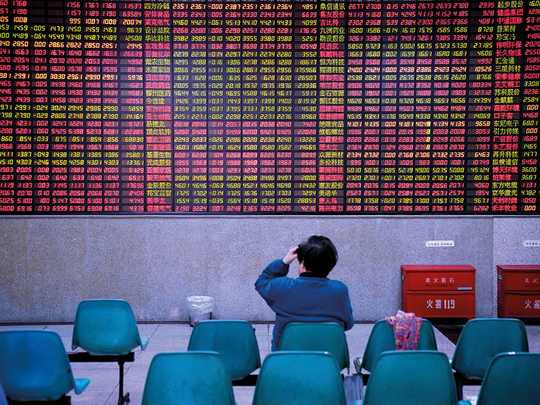
Dubai: Emerging markets may be back in vogue after getting battered, due to worries about a trade war between the United States and China and a stronger dollar.
Pictet Asset Management has changed its view on emerging markets from neutral to positive, as cheap bargains emerge.
The MSCI emerging market index has gained 1.08 per cent in the past one year, underperforming the Dow Jones Industrial Average, which has gained 16.03 per cent in the same time period.
The under-performance was mainly due to a stronger dollar, higher US interest rates and escalating trade tensions between the world economies.
“There are signs that the worst may be over — developing economies’ real GDP is growing faster than developed economies, and the recent decline in energy and commodity prices should offer additional support to manufacturing,” Luca Paolini, chief strategist at Pictet Asset Management said.
To ward off any uncertainty from trade wars, Columbia Threadneedle has moved away from holding cyclical companies in its portfolio and are investing in companies which are less exposed to rhetoric about trade protectionism, and well-placed to profit from domestic consumption. Columbia Threadneedle are looking at companies in the dairy and drinks sectors, for instance.
“Long-term trends also favour emerging markets. Massive productivity and population growth will continue to translate into stronger economic growth. Companies are profiting from the rise in domestic consumption,” Krishan Selva, client portfolio manager investments, equities at Columbia Threadneedle said.
Bright spot
According to Pictet, China is a bright spot due to strong consumption and construction activity.
“Monetary policy easing is improving liquidity conditions, and authorities have also announced fiscal stimulus plans,” Paolini said.
Overseas buyers have been net buyers of Chinese equities, which has been the world’s most battered market. Overseas investors bought 29.4 billion yuan ($4.3 billion) of stocks during the past three weeks, according to Bloomberg data.
The Shanghai Composite Index has been the worst performer among the world indices, registering 15 per cent losses in the year so far.
For Pictet, Japan is the favoured developed equity region, and are cautious on Europe, “given the possible impact on growth from US trade measures, especially on export dependent Germany.”
Equity markets in the United States look expensive to Pictet and the asset manager is underweight particularly as “US companies look unlikely to repeat their blockbuster earnings performance of recent months.”
“We remain neutral on technology and cautious towards industrials, financials and consumer discretionary. We remain overweight in health care, a defensive sector insulated from trade tensions,” Paolini said.
The US markets have been on a record breaking rally, with the Dow Jones Industrial Average gaining 3.50 per cent so far in the year.
Columbia Threadneedle likes the outlook for profits in the US, and particularly like technology and financials. “From a portfolio construction standpoint, we like the diversification in the health care sector and the fact it is differentiated from defensive-like staples that do not generate earnings growth,” Nadia Grant, head of US equities at Columbia Threadneedle said.
In all, the name of the game is stock picking amid the political noise.
“The market is, at times, very good at cutting out the noise and focusing on fundamentals, but at other times the political rhetoric and noise prevail and influence price actions too much. When these moments occur, we must remember our disciplined investment approach and source opportunities in the portfolio. These are proper hunting grounds for stock pickers,” Grant said.












